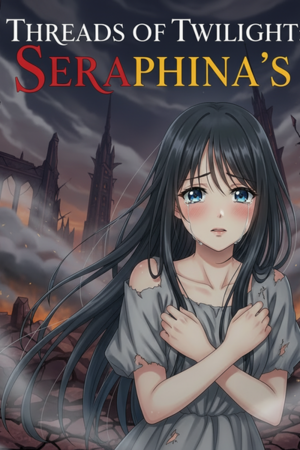Chapter 7:
Lessons in Light
Threads of Twilight: Akari & Ren
For three days, Akari lived as a holy relic in a gilded cage. Her existence was a meticulously scheduled sequence of reverent, suffocating attentions. She woke each morning in a bed of impossibly soft silks, the fabric so fine it felt like sleeping on a cloud, to the sight of twin moons hanging in a pale, alien sky outside her immense crystal window. Her every need was attended to by a pair of silent, white-robed acolytes who moved with the ghostly, unnerving grace of specters, their feet making no sound on the polished marble floors. They were her shadows, her keepers, their faces rapt with a devotion that was more terrifying than any jailer's scowl.
They drew her baths in a sunken marble tub, the water infused with fragrant, glowing petals that left her skin shimmering with a faint luminescence. They dressed her in elegant white and gold gowns, the heavy, embroidered fabric feeling more like ceremonial vestments than actual clothes, each one designed to emphasize her otherworldly purity. They served her exquisite meals on trays of polished silver—delicate fruits she didn’t recognize, sweet cakes that tasted of honey and sunlight, and clear broths that were nourishing but left her perpetually unsatisfied. And through it all, they watched her. It was a constant, unnerving vigilance, a surveillance disguised as adoration.
Their reverence was a prison more effective than any iron bars; their adoration was a set of invisible chains, binding her to the role they had chosen for her. She was the Light-Bringer, a living artifact to be polished, maintained, and displayed, and they were her diligent, zealous curators.
In the raw, chaotic aftermath of her arrival, she had tried a more direct approach. Her initial, grief-stricken demands to know Ren’s fate, her desperate, tearful pleas to be sent home, had been met with placating smiles and gentle, condescending deflections. To them, her trauma was a temporary, mortal illness, a fever of the soul that would soon break, allowing her true, divine consciousness to emerge from the shell of the confused girl.
They would listen patiently to her frantic questions and then respond with serene, unhelpful platitudes like, “The Most High’s plan is a tapestry of infinite complexity; we cannot see the full pattern,” or, “Rest now, Light-Bringer. Clarity will come with purity.”
She had learned quickly, with the sharp, survivalist instinct of a performer who knows her audience, that emotional confrontation was useless. They were a wall of unshakeable faith, and her grief was a wave that could only break against them. So, she played their game. She built a new mask, not for a paying audience, but for her captors. She adopted an air of quiet, serene compliance, a holy tranquility that seemed to be the natural result of their pious care. She ate the food without complaint, she wore the suffocatingly beautiful clothes, and she answered their gentle, probing questions with a placid, beatific expression, her voice flowing in the melodic, alien tongue that was now her own.
This was a performance, just like the ones on stage in Tokyo, but the stakes were infinitely, terrifyingly higher. Her internal monologue, once a chaotic storm of grief and terror, was now a quiet, sharp hum of observation and analysis. She was gathering information, listening, watching, searching for any weakness in the flawless, beautiful walls of her prison, any clue that could lead her back to the truth. Back to Ren.
Her most frequent keeper was a young acolyte named Seraphina, a girl barely older than herself, whose wide, guileless eyes shone with the unwavering fire of a true believer. She was the easiest to read, her emotions an open book of awe and reverence. “The Pontiff will be seeing you in the Great Library today, my lady,” Seraphina said one morning, her voice hushed with a breathless wonder as she braided a golden ribbon into Akari’s clean, brown hair. “He wishes to instruct you on the history of the Covenant. It is an honor few have ever been granted in a thousand years.”
“I am grateful for his guidance,” Akari replied, her voice a soft, melodic thing that sounded nothing like her own but was precisely what Seraphina expected to hear.
The Great Library of Zion was a place of overwhelming scale and profound silence, a cathedral dedicated to a single, approved version of history. Books bound in white leather and stamped with gold leaf lined shelves that stretched hundreds of feet up toward a vaulted ceiling painted with the constellations of an alien sky. Sunlight, pure and white, streamed through massive crystal windows, illuminating floating dust motes like a galaxy of tiny, captured stars. Pontiff Malachi stood waiting for her before a towering tapestry that depicted a millennium of holy war in vibrant, bloody, and heroic detail.
“Light-Bringer,” he greeted her with a serene, paternalistic smile. “It is time you understood the sacred legacy you now inherit.”
For the next hour, he guided her along the woven chronicle, his long, pale finger tracing the threads of history. He showed her the images of past Light-Bringers, radiant, beautiful figures wreathed in golden light, their faces serene as they smote shadowy, monstrous beasts and horned, demonic warriors. He spoke of their righteousness, their sacrifice, and the unwavering, absolute will of The Most High. It was a beautiful, heroic, and utterly one-sided story of light vanquishing a mindless, evil darkness. Akari feigned rapt attention, nodding in all the right places, her mind a cold, efficient filter, discarding the grand, self-serving narrative and searching only for actionable intelligence.
“Pontiff,” she interrupted, her tone one of innocent, theological curiosity, a student seeking to better understand the divine will. “The histories speak of the Light-Bringer being ‘called’ to service. But what of the vessel the Void claims? Is the soul truly… erased, as you said? Or is it merely imprisoned within the darkness, a captive soul that could, perhaps, be redeemed by the Light?”
Malachi’s silver eyes rested on her, a flicker of surprised approval in their depths. He was pleased by her sharp, pious question. “A keen inquiry, born of a compassionate heart. The scripture teaches us that the Void is an absence, a perfect nothingness. To be filled by it is to be unmade. There is no soul left to imprison, no captive to redeem.” He offered a thin, reassuring smile. “Do not trouble your mind with the fate of the shell that was your friend. It is an empty, irrelevant thing now. All that matters is your holy purpose.” A dead end. But it was information nonetheless: they saw Ren as a non-entity, a costume worn by a monster. They would never consider trying to save him.
Her next lesson was with General Gideon, on the Parade Ground of the Archangels, a vast, open space that rang with the clash of steel on steel and the unified, rhythmic shouts of thousands of soldiers drilling with a terrifying, inhuman precision. “Faith is our shield, but steel is our sword,” Gideon rumbled, his voice a low growl as he led her to a secluded training ring, away from the prying eyes of the common soldiers. He presented her with a simple, unadorned sword of polished steel, its hilt wrapped in practical, worn leather. “You must learn to wield both.”
Akari took the weapon. It was heavy, cold, and felt brutally awkward in her hand. Back home, her hands were used to the familiar weight of microphones and the delicate work of signing autographs, not instruments of death. Gideon attempted to show her a basic fighting stance, a simple parry. She tried to mimic his powerful, efficient movements, but she was clumsy, her body uncooperative, her mind rebelling at the very idea of using this thing to hurt someone.
After several minutes of her fumbling, Gideon’s legendary patience wore thin. “You are hesitant,” he growled, his one good eye narrowed in frustration. “You cannot hesitate on the battlefield. When you face one of The Fallen, it is your life or theirs. There is no middle ground, no room for doubt.”
“I am not a soldier,” she said, her voice quiet, a small rebellion against the role he was forcing upon her.
“You are a weapon of The Most High!” he snapped, his frustration finally boiling over into a sharp, angry roar. “Act like it!”
His sharp tone, so full of righteous, unthinking anger, struck a nerve deep inside her. A flash of memory—Ren’s face, contorted in terror as he was swallowed by the silent, hungry dark—seared through her mind. A surge of hot, desperate emotion—her fear for him, her grief at his loss, her white-hot rage at these people who called him a monster—welled up inside her, a tidal wave of pure, untamed power.
The sword in her hand erupted in a flash of brilliant, pure light. It became intensely, incandescently hot, the solid steel glowing white and gold, the air around it shimmering with a heat that had no physical source. Akari cried out in shock and pain, dropping the weapon as if it were a burning coal. The blade clanged against the stone floor, hot enough to make the rock hiss and glow a bright cherry-red where it lay.
Gideon stumbled back, his one good eye wide with a mixture of shock and utter, terrified awe. He stared not at the glowing sword, but at her, at the small, trembling girl who had just channeled a power he had only ever read about in the most sacred texts. He wasn’t looking at a clumsy student anymore. He was looking at a miracle. With a clatter of his heavy armor, he dropped to one knee, bowing his head.
“Forgive me, Light-Bringer,” he breathed, his voice stripped of its anger, now holding only profound reverence. “I was blind. Your power is not of the arm, or of the steel. It is of the soul.”
On the third day, they decided it was time for her to see the enemy, to witness the justification for their endless war. “There is a village to the west,” Malachi informed her as Seraphina fitted her with a pristine, white travelling cloak. “A border settlement called Bethany. It suffered a raid by The Fallen three nights ago. It is time you witnessed their handiwork firsthand.”
The journey on the back of the winged Cherub, a majestic creature with the body of a lion and the wings of a great eagle, was swift and silent. The smell of smoke, acrid and bitter, reached them long before the village itself came into view. Bethany was a blackened, weeping wound on the otherwise idyllic, sun-drenched landscape. Charred timbers of what were once homes pointed to the sky like the skeletal fingers of the dead. A palpable miasma of grief and fear hung over the entire settlement, a silence that was heavier than any sound.
Malachi led her on a tour of misery. He showed her the ruins of the burned-out temple, the weeping, shell-shocked survivors huddled in makeshift tents. Their stories, which he encouraged them to share with their new savior, were a litany of disjointed horrors. Horned beasts with black wings had descended in the dead of night, not as a disciplined army, but as a wave of mindless, insane rage. They had not just killed; they had butchered, tearing men apart with their bare hands and setting fire to homes with no apparent strategic purpose.
Akari listened, her heart a cold, heavy stone in her chest. The suffering she saw was real and undeniable. The grief in the eyes of a woman who had lost her husband was not a lie. The fear of a man who had seen his home burn was not an act. And yet… her heart ached with a deep, unshakable certainty that defied the horror laid out before her. This was not Ren. It couldn't be. Her mind, frantic to reconcile the two realities, grasped for an explanation. He was their king, yes, a title forced upon him, but he was new to this world, new to his power. Perhaps he didn't even know about this attack. Perhaps some ruthless, bloodthirsty chieftain had acted without his orders, a rogue element in his chaotic new kingdom. That had to be it. Because the boy she knew—the quiet, gentle boy who would carefully move a spider outside rather than kill it—would never, could never, sanction this kind of brutal, pointless slaughter. He would be horrified. Once she found him, once she could just talk to him, he would surely stop this. He would be able to control his people and prevent this from ever happening again.
They were all mistaken. Malachi, Gideon, all of them. They had judged him without knowing him, and she had to find him. Not just to bring him home, but to prove to this entire world that the kind, gentle boy she loved was not the monster they so fervently believed him to be.
Her thoughts were interrupted as Malachi guided her into the village's largest remaining building, now a makeshift infirmary. The air was thick and heavy with the smell of blood, antiseptic herbs, and raw, human pain. She saw horrific, unnatural injuries—deep gashes that seemed to sizzle with a dark, necrotic energy, wounds that refused to close. Her gaze fell upon a small child on a cot in the corner. A little girl, no older than seven, her leg wrapped in crude, blood-soaked bandages. She was pale and trembling, not from pain, but from shock, her eyes wide and unfocused with a trauma no child should ever have to witness.
Something inside Akari, a deep, primal well of empathy that no amount of indoctrination could touch, broke. She moved before she was even aware of it, crossing the room and kneeling by the little girl’s cot. The child flinched away from her, a small, frightened whimper escaping her lips.
“It’s okay,” Akari said softly, her voice the one she used for Ren, gentle and stripped of all artifice and alien cadence. “I’m not going to hurt you.”
She reached out, her hand hovering over the girl’s bandaged leg, a simple, human instinct to comfort overriding everything else. A gentle, warm light, the color of a perfect sunrise, bloomed from her palm. It was not the searing, incandescent light from the training yard, but a soft, healing radiance. It seeped through the crude bandages, and as it did, the little girl’s violent trembling began to subside. A flicker of healthy color returned to her pale cheeks. The whimpering stopped, replaced by a soft, sleepy sigh as the pain and terror finally receded. Akari snatched her hand back as if burned, staring at it in utter shock.
A collective gasp went through the crowded room. She looked up. Malachi, Gideon, the village priests, the other wounded—everyone was staring at her, their expressions a mixture of profound shock, awe, and fervent, terrifying worship.
“The touch of the divine,” Malachi breathed, his silver eyes gleaming with a religious ecstasy that chilled her to the bone. “She is the one.”
On the journey back to Zion, they were silent, but their renewed reverence was louder than any shout. They were thrilled. They had seen the proof of her divinity—the power to destroy her enemies and the power to heal the innocent. She was their perfect weapon, their perfect saint, her purpose now confirmed beyond all doubt.
Akari, however, felt more isolated and trapped than ever. She sat in her vast, beautiful room that night, staring out at the twin moons. The suffering in Bethany was real. The power in her hands was real. The horror stories were real. But so was the unshakable, absolute truth of Ren's goodness. The world they were showing her and the world she knew in her heart could not both be true. Their indoctrination had failed in the most spectacular way possible. They had wanted to forge a zealot, a holy warrior who would hate the darkness with every fiber of her being. Instead, they had armed their prisoner with a terrifying, dual-edged power and a single, burning, and now more urgent question: What is the truth?




Please sign in to leave a comment.